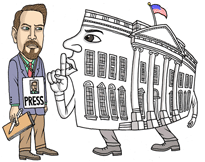The Education of a 9/11 Reporter
The inside drama behind the Times' warrantless wiretapping story.
By Eric Lichtblau
Posted Wednesday, March 26, 2008, at 7:08 PM ET

Illustration by Mark Alan Stamaty.
This article is adapted from Eric Lichtblau's upcoming book, Bush's Law: The Remaking of American Justice, to be published next Tuesday, April 1, by Pantheon. He and fellow New York Times reporter James Risen won a 2006 Pulitzer Prize for breaking the story of the National Security Agency's wiretapping program.
For 13 long months, we'd held off on publicizing one of the Bush administration's biggest secrets. Finally, one afternoon in December 2005, as my editors and I waited anxiously in an elegantly appointed sitting room at the White House, we were again about to let President Bush's top aides plead their case: why our newspaper shouldn't let the public know that the president had authorized the National Security Agency, in apparent contravention of federal wiretapping law, to eavesdrop on Americans without court warrants. As New York Times Editor Bill Keller, Washington Bureau Chief Phil Taubman, and I awaited our meeting, we still weren't sure who would make the pitch for the president. Dick Cheney had thought about coming to the meeting but figured his own tense relations with the newspaper might actually hinder the White House's efforts to stop publication. (He was probably right.) As the door to the conference room opened, however, a slew of other White House VIPs strolled out to greet us, with Secretary of State Condoleezza Rice near the head of the receiving line and White House Counsel Harriet Miers at the back.
For more than an hour, we told Bush's aides what we knew about the wiretapping program, and they in turn told us why it would do grave harm to national security to let anyone else in on the secret. Consider the financial damage to the phone carriers that took part in the program, one official implored. If the terrorists knew about the wiretapping program, it would be rendered useless and would have to be shut down immediately, another official urged: "It's all the marbles." The risk to national security was incalculable, the White House VIPs said, their voices stern, their faces drawn. "The enemy," one official warned, "is inside the gates." The clich�s did their work; the message was unmistakable: If the New York Times went ahead and published this story, we would share the blame for the next terrorist attack.
More than two years later, the Times' decision to publish the story�a decision that was once so controversial�has been largely overshadowed by all the other political and legal clamor surrounding President Bush's warrantless wiretapping program: the dozens of civil lawsuits; the ongoing government investigations; the raging congressional debate; and the still-unresolved question, which Congress will take up again next week, of whether phone companies should be given legal immunity for their cooperation in the program. Amid the din, it's easy to forget the hits that the newspaper took in the first place: criticism from the political left over the decision to hold the story for more than a year and from the right over the decision to publish it at all. But the episode was critical in reflecting the media's shifting attitudes toward matters of national security�from believing the government to believing it less.
After all, the fear and trauma that gripped the country in the months and years after 9/11 gripped the media, too; the country's outrage was our outrage. Coverage of 9/11 and its aftermath consumed all else for reporters in Washington. As federal officials scrambled to avert the much-feared "second wave" of attacks, reporters likewise scrambled to follow any hint of the next possible attack and to put it on the front page�from scuba divers off the coast of Southern California to hazmat trucks in the Midwest and tourist helicopters in New York City. One example of the shift: On Sept. 12, 2001, another major newspaper was set to run a story on the extraordinary diplomatic maneuverings the U.S. Secret Service had arranged with their Mexican counterparts to allow Jenna Bush, then 19, to make a barhopping trip south of the border. (She had just been charged with underage drinking in Texas.) A few days earlier, a scoop about a presidential daughter's barhopping trip getting special dispensation from the Secret Service and a foreign government might have gotten heavy treatment. But the story never ran, and the Secret Service's maneuverings remained a secret until now. In the weeks and months after 9/11, there was no longer an appetite for such stories.
At the same time, in the first few years after 9/11, stories that have now become frequent front-page fodder�about water-boarding of terrorism detainees and other aggressive interrogations tactics, about CIA "black site" prisons overseas, or about covert eavesdropping or other surveillance programs that stretched the limits of the law�simply didn't get written by most of the mainstream media. If we had known about them, which in most cases we didn't, there would have been a reluctance to publicize them in those early days of the war on terror.
more...
http://www.slate.com/id/2187498/pagenum/all/#page_start